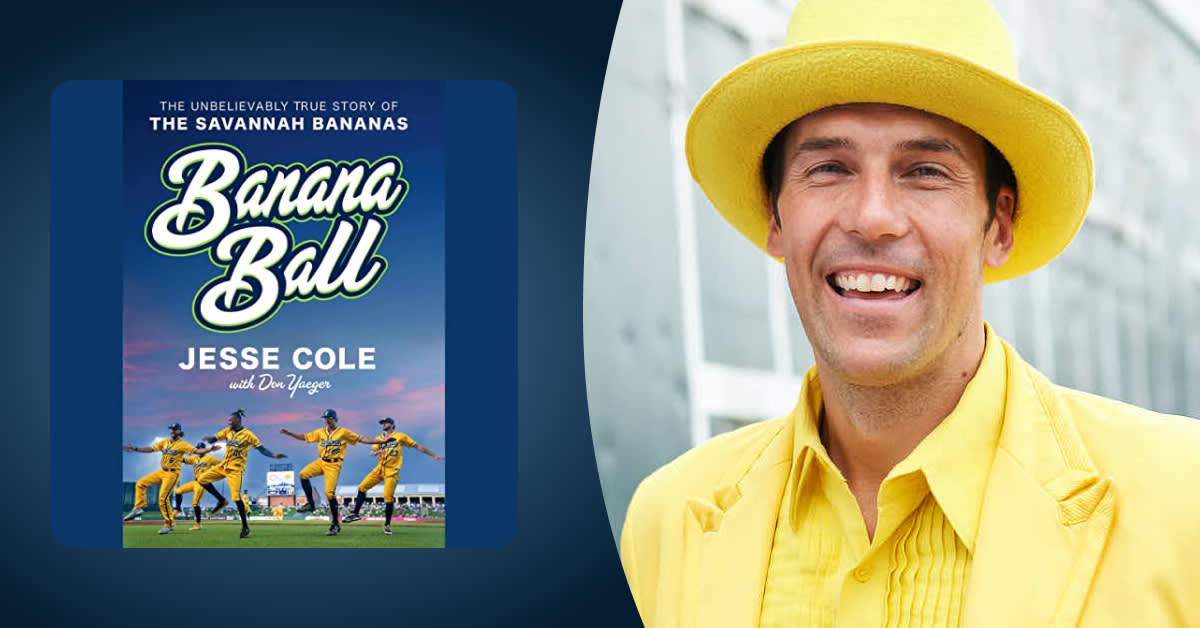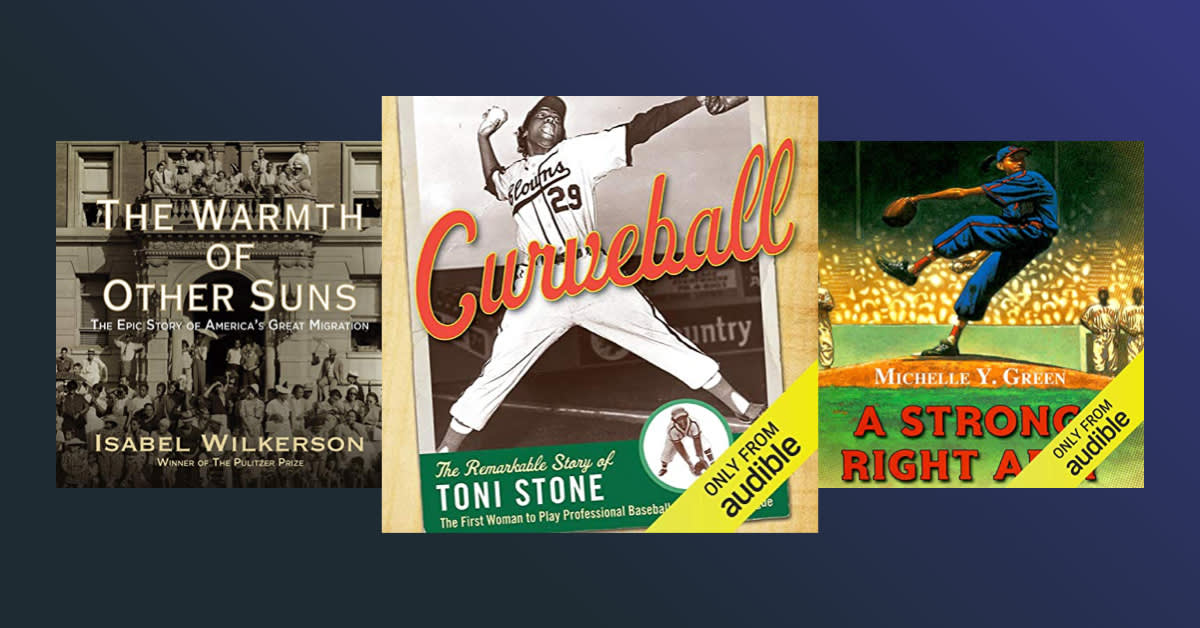Ask any baseball fan and they'll tell you: Some of their favorite sounds can only be heard at the ballpark—the smooth, satisfying pop of a catcher’s glove as a pitch hits its mark; the crack of a bat as it tears into a fastball, explosive and hopeful, drawing the crowd to their feet; the distinct bark of vendors peddling popcorn and peanuts; the chants, cheers, and jeers of the crowd, echoing their enthusiasm, disappointment, and scorn. Our list below, a roundup of outstanding baseball audiobooks, offers a glimmer of that same ballpark magic with just a few of the greatest stories from our national pastime.
As a native New Yorker and diehard Mets fan, please allow me to get my bias out upfront. It would be impossible for me to address the best in baseball without paying respect to “the Franchise” himself: Hall of Famer Tom Seaver, one of the greatest pitchers in baseball history who represented the very heart of the New York Mets. To understand what Seaver meant to the game and to the NL East underdogs, look no further than acclaimed sports journalist Wayne Coffey’s They Said It Couldn’t Be Done. Chronicling the rise and unexpected triumph of the 1969 Miracle Mets, this listen follows “Tom Terrific” and his teammates as they catapulted from league laughingstock to World Champions. What really makes this audiobook soar is the familiar, warm narration of the incomparable Gary Cohen, who has been the beloved play-by-play announcer for the Mets on SportsNet NY (SNY) for 15 years. The Mets have the very best booth in baseball (sorry, not sorry), and with Cohen at the helm, this listen is all the more amazin’. (Oh, and if you're looking for another unforgettable—albeit far less wholesome—story of a Mets championship team, don't miss Jeff Pearlman's thoroughly entertaining The Bad Guys Won.)
In the early 2000s, baseball endured an ideological crisis as the traditions of more than a century were replaced by a new, analytical way of thinking about assembling teams and winning championships. Author and journalist Michael Lewis takes a deep dive into this turn towards analytical assessments of players and performances in Moneyball. This listen follows the data-driven transformation of a small-market team, the 2002 Oakland Athletics. Determined to put up a fight against big-budget powerhouses, General Manager Billy Beane paired with strategist Paul DePodesta to develop a sabermetrics formula that would build a team of top performers and ultimately take the A’s to the American League Championship Series. Hall of Fame narrator Scott Brick, whom one listener dubbed “a consummate professional in the narrator bullpen,” delivers the saga with a sense of intrigue that will capture the attention of even the most diehard traditionalist.
The 2023 CASEY Award—an annual honor bestowed upon the best baseball book of the year—was clinched by journalist Joe Posnanski for his history-spanning Why We Love Baseball. It’s no wonder why: in recounting 50 of the sport’s greatest, most memorable moments, Joe Po paints a triumphant portrait of America’s pastime that brims with both a fan’s enthusiasm and a reporter’s know-how. Narrated in turns by Posnanski and actor and MLB Network analyst Ellen Adair, this audiobook will leave you reliving extraordinary plays, heartstring-tugging moments, and all the mishaps and blunders along the way. As the title betrays, it's a listen that encompasses everything we love about this beautiful, frustrating, thrilling, disappointing, electric, contemplative, unpredictable, and ultimately, tremendously human game.
For professional ballplayers, there are few honors as aspirational and humbling as being inducted into the Baseball Hall of Fame. From Lou Gehrig to Hank Aaron to Willie Mays to Ted Williams, golden placards of men-turned-legends line the walls of Cooperstown, representing the very best the game has to offer. In this comprehensive collection, biographies of every inductee into the Hall—from its inception to 2014—give listeners a glimpse into what makes a player truly great. To lend an even more intimate touch, Hall of Fame position players offer their own perspective in a series of essays woven throughout the narrative. The result is a listen that offers an in-depth history of baseball’s giants and a window into how sports superstars become national heroes.
Every fan has experienced this moment: you’re sitting in the stands, chowing down on a hot dog, your eyes glued to the field. The count’s 3-2 and you’re on the edge of your seat as the batter steps back towards the plate. He’s nearly struck by the pitch and you’re sure he’s about to walk when you see the home plate ump hammer his fist forward, and you realize he’s been called out. And though it might be painful to watch, Keith Law, senior baseball writer for The Athletic, argues that what we might deem a terrible call may actually have its roots in psychology and cognitive science. In The Inside Game, Law sets out to analyze the motivation behind vexing decisions in baseball, from the choice to swing to the deliberations behind some of the biggest trades in history. This fascinating and fun delve into the biases, belief systems, and behavioral patterns that can lead to seriously misguided decision-making just might give you a better understanding of the reasoning behind those frustrating trades and calls.
On April 15, 1947, Jackie Robinson made history when he shattered the color barrier that kept professional baseball segregated. The Hall of Fame inductee originally played for the Negro League’s Kansas City Monarchs before being signed to the Brooklyn Dodgers, where he made tremendous strides for the civil rights movement, particularly in regards to sports and entertainment. In his touching and inspiring memoir I Never Had It Made, Robinson details his time with the Dodgers, the discrimination and abuse he routinely faced during his trailblazing MLB run, and his life after retirement. While you might be familiar with his illustrious career, the heart of this listen lies in hearing Robinson explain, in his own words, which are brilliantly voiced by actor and activist Ossie Davis, stories from his childhood, the devastating impact of Jim Crow laws, and the anguish of helping his son through addiction only to tragically lose him in a car accident. Though he endured great pain throughout the course of his life, Robinson exhibits an admirably strong sense of determination and grace that is second to none. And it’s that exact depth of character that made him a hero on and off the field.
Fastball, slider, changeup, cutter, sinker, curveball, knuckleball, splitter, screwball, spitball: these are the titular pitches that Tyler Kepner, national baseball writer for The New York Times, examines in his charming, author-narrated K: A History of Baseball in Ten Pitches. A fascinating exploration of baseball history through the dynamics of how just a slight variation in the way a pitcher grips a ball can make a world of difference in trajectory and speed, K is brought to life by a colorful cast of characters whose innovations changed the art of pitching forever. Kepner—whose enthusiasm and mastery on the subject shine in both his writing and delivery—offers insights garnered from discussions with major league aces, including Nolan Ryan, Bob Gibson, and Mariano Rivera, crafting what just might be the definitive work on the background and mechanics of what makes a truly filthy pitch.
In the athletic world, there are few groups more superstitious than professional ball clubs. Players, managers, coaches, and fans alike all engage in some form of ritual that they believe will ward off bad luck and ensure the team’s victory. These superstitions, along with the age-old traditions and unwritten rules of America’s pastime, are explored in Jason Turbow’s enormously entertaining The Baseball Codes. Filled with colorful anecdotes of cheaters, practical jokers, and sly schemers, this gem offers up something special for anyone who likes their sports audiobooks with a sense of humor and a lot of heart. If you’ve ever found yourself perplexed at why a particular play is overwhelmingly shunned, this listen offers insider insight you won’t want to miss.
It’d be impossible to craft a list of the best baseball audiobooks of all time without tipping our caps to former World Series champ Jim Bouton and his adored (and controversial!) diary-memoir, Ball Four. This author-narrated irreverent retelling of memories made in the season of 1969 made quite a stir when it was initially published, as it was among the first to strip the uptight veneer off of sports reporting and recount events as they really happened, even when they verged on uncouth. It earned him censure from then-commissioner Bowie Kuhn, teammates, and adversaries alike—Pete Rose of the Cincinnati Reds, for one, generated headlines with his own obscene opinion shouted towards Bouton from the dugout, while others labeled him a traitor or a social pariah. But what Bouton achieved in exposing the previously unseen life of the professional athlete—the womanizing, the drug use, the foul language and off-color jokes, the frustrations with coaches and managers—was quite remarkable. His refreshing honesty and humor humanized larger-than-life American heroes and paved the way for sportswriters to come.
Professor Louis Moore of Grand Valley State University focuses much of his research and professional work on the intersection of race and sports history. Moore’s latest work, The Great Black Hope, examines the sociological side of sports, following two Black quarterbacks who stepped into a role primarily filled by white athletes and were forced to endure racial discrimination and hate as a result. For those more diamond-inclined, there’s his exceptional Great Courses lecture A Pastime of Their Own. Here, Moore recounts the story of Negro League Baseball and how the segregated world of sports served as a reflection of the ongoing fight for equity beyond the ballpark. From the origins of the color line and legendary NNL organizer Rube Foster to the hard-won path toward integration and Jackie Robinson’s barrier-shattering signing to the Brooklyn Dodgers, Moore covers everything you need to know—on the field and off.
There’s nothing quite like the beauty and exhilaration of a baseball stadium. From stunning architecture to the contrast of perfectly manicured grass and deep, ruddy sand, ballparks are one-of-a-kind structures that reflect the city, traditions, and character of the home team. Pulitzer Prize-winning architecture critic Paul Goldberger serves up an exquisite history in the aptly titled Ballpark, taking a cross-country, century-spanning journey from Brooklyn’s Union Grounds to Cincinnati’s Palace of the Fans to Baltimore’s Camden Yards. Goldberger uses his expertise to analyze how the American ballpark reflects shifts in socioeconomics and the prospects of urban development and growth. If you ever wanted details beyond the diamond, this listen is a joyful exploration of the parks we love and the future of stadiums to come.
The average professional pitcher throws a fastball at more than 92 miles per hour, and the strain of routinely whipping your arm at practically superhuman speed takes its toll. Pitchers are plagued by injury, and the demand for high performance has only heightened the risk. In The Arm, baseball columnist Jeff Passan analyzes the ever increasing rate of torn ulnar collateral ligaments—an affliction treated by a procedure commonly known as Tommy John Surgery—in professional pitchers, young prospects, and little leaguers alike. Passan crafts a listen that offers stirring insights into pitchers, including Hall of Famer Sandy Koufax and closer Daniel Hudson, whose lives and livelihoods have been directly affected by the injury epidemic. And along the way, he reveals a shocking trail of neglect by the establishment that has allowed the trend to continue, triggering teams to lose money and budding athletes to risk their health.
New York Yankees great Yogi Berra is foremost known for his skills behind home plate, but his so-called “Yogi-isms”—endearing and oddly inspirational malapropisms and perplexing quips—have taken on a legacy on their own. Amongst the most famous? Berra was quoted as saying: “Baseball is ninety percent mental. The other half is physical.” Mathematics aside, Bob Tewksbury would seem to agree. In Ninety Percent Mental, the former MLB pitcher and current Cubs mental skills coordinator gives listeners an inside look at the cognitive aerobics that baseball players employ every time they take the mound or step up to the plate. In both his writing and his narration, Tewksbury speaks with a well-earned sense of authority on the subject of sports psychology, discussing how players are able to wield mental tools like imagery and strategic planning to get in the zone and reach peak performance. This is a must-listen for any baseball fan who’s ever been curious about what’s going on inside their favorite player’s head.
If you’re looking for an audiobook that focuses on the history of baseball itself, Play Ball! is an excellent Great Courses pick. Written by baseball historian Peter Morris and Baseball Hall of Fame researcher and presenter Bruce Markusen, this comprehensive chronicle offers a glimpse into how a simple bat-and-ball game originating decades before the Civil War evolved into the booming industry and nation-defining pastime that it is today. In a series of 24 lectures narrated by Markusen himself, this listen is a balanced, complete retelling of the history of the game—and all the challenges, changes, and controversies that developed along the way. From the origins of gear like catcher’s masks to the difficulties faced by women and African Americans who took the field, Play Ball! offers up an informative account that will give you a new appreciation for the sport.
No matter who you root for, the desired outcome for baseball fans is universal—we all want nothing more than to see our team win the pennant and head off to the World Series. In The Grandest Stage, Tyler Kepner, sports columnist and author of the aforementioned K, turns his thoughtful eye toward the history of baseball’s Fall Classic. Homing in on the postseason at its climactic, most emotionally fraught moment, Kepner examines the legacy of teams and athletes who secured their spot in the baseball history books—for better or for worse. This listen is cleverly divided into seven chapters mirroring the seven potential games of the World Series, shining a light on sports mythos (like Babe Ruth’s fabled 1932 called shot), champions both renowned and unsung, and gets to the heart of the matter when it comes to the pains and pressures of playing at the highest level.
With so much technological and analytical advancement since the initial dawn of sabermetrics, as well as more than a decade since the remarkable Moneyball was first published, it follows that a new strategy and system would emerge. Enter The MVP Machine. In this listen, Ben Lindbergh (co-author of another great listen, The Only Rule Is It Has to Work) and Travis Sawchik explore the emerging, cutting-edge tech that has led teams to World Series victory and helped turn underrated prospects into MVPs. The authors make a fascinating case for the novel tools that have completely revolutionized drafting, coaching, trades, and plays, emphasizing potential and promise over big-picture success. It’s a captivating audiobook for any fan fascinated by baseball’s turn towards tech.
If you haven’t yet heard the story of Toni Stone, the first of only three woman to play professional baseball for the all-male Negro League’s Indianapolis Crowns, don’t miss Martha Ackmann’s excellent biography, Curveball. Ackmann follows Stone’s journey from a tomboyish childhood spent reading rulebooks and pitching for the local boys-only baseball team to her boundary-shattering big break. Sensing an opening when Black players began to join a newly integrated major league, Stone stepped up to replace home-run hero Hank Aaron on the Crowns before later taking a spot on Jackie Robinson’s former team, the Kansas City Monarchs. Overcoming tremendous adversity on the field and off, Stone persevered through the sting of both racism and misogyny to emerge as one of sport’s greatest unsung heroes: an unapologetic, extremely talented young woman unafraid to break society’s rules in order to follow her dreams.
Though they might seem like relics of a bygone era, the collecting and trading of baseball cards is still a hobby with a dedicated following. If you want to learn more about how those glossy pieces of cardstock altered the history of baseball forever, check out journalist Dave Jamieson’s history, Mint Condition. After Jamieson learned there was no resale demand for his childhood baseball card collection nor card shops to visit, he decided to trace the rise and fall of the baseball card industry—from its origins as an advertising technique in packs of cigarettes and gum (the latter of which helped the sweets industry through the Great Depression) to the lucrative multi-billion dollar trade it had become by the 1980s. This audiobook deftly explores both the impact of cards on unions and the sport as a whole, as well as ins-and-outs of collecting, including card grading and value. The result is a loving, nostalgia-inducing portrait of enthusiasts. (And if you’re interested in the players immortalized in the cards themselves, follow this listen up with Brad Balukjian’s The Wax Pack, a rollicking series of interviews with those featured in a pack of cards from 1986.)
If you’re a denizen of the internet, chances are you’ve come across the truly delightful Savannah Bananas. The team offers an accessible spin on baseball that focuses more on the core feelings—connection, joy, a shared experience—behind America’s greatest athletic tradition, championing a “Fans First” mentality that rejects gatekeeping and staid heritage. Clad in their bright yellow uniforms and equipped with charisma, charm, and seriously enviable dance moves, the team has captured the hearts of more than eight million TikTok followers and counting with their participation in viral trends and quirky on-field antics. Every game of Banana Ball feels like a celebration, embracing joy at every turn and unafraid to get a bit silly. And that’s far from an accident. In his memoir Banana Ball, written with author Don Yaeger, franchise owner Jesse Cole gets real about prioritizing belonging, fun, and community, and in the process, forever changing the game.
Sometimes, there’s nothing quite like curling up with some sports fiction. If you’re a fan of Field of Dreams, one of the most iconic baseball films of all time, try the touching novel that served as its inspiration. Shoeless Joe captures the same heart, sentimentality, and warmth of the film adaptation as it tells the tale of Iowan farmer Ray Kinsella’s spiritual connection to the game—one that drives him to build a baseball stadium for a very special game, right in his own cornfield. Or, if your favorite baseball movie is 1984’s The Natural, try Bernard Malamud’s novel on which it was based. Roy Hobbs, the protagonist of The Natural, is a bonafide prodigy whose innate skills at the game are unparalleled. But just as his professional career is getting started, it’s derailed in a tragic, unpredictable way, and he’s forced to get his life back on track. And though there’s no film adaptation (yet!) of Chad Harbach’s excellent collegiate listen, The Art of Fielding, we recommend it for any fan of baseball fiction. It follows rising baseball star Henry Skrimshander as he sets out on the most important season of his college career—all the while navigating young love, family turmoil, and the expectations of his future.




































